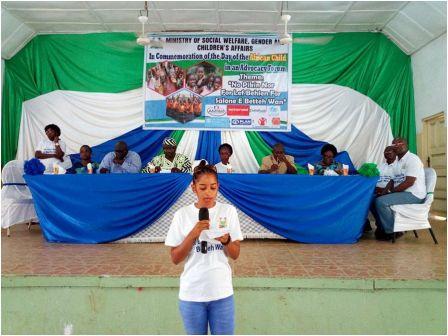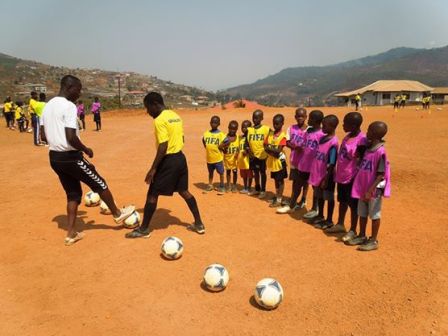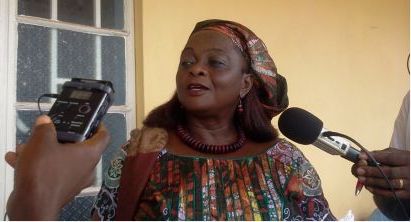The Day of the African Child Public Advocacy
Speech by Amy Smythe, first Minister for Gender and Children’s Affairs, now gender consultant presented at the Miatta Conference Hall, Freetown, Sierra Leone on 16 June 2010. (Photo: left, Amy Smythe)
Theme: Planning and Budgeting for Children: Our collective responsibility
Let me start by thanking the Ministry of Social Welfare Gender and Children’s Affairs for giving me the opportunity to identify once again with our children in Sierra Leone.
Since the early 1990s , 1993 to be exact, when Sierra Leone started commemorating the Day of the African Child, progress seems to have been made in the kinds of activities organized by various stakeholders on this day. The reason for setting aside a day is to make sure that children become the center piece of reflection and discussion with a view to improving their situation. In the 1990s after Sierra Leone ratified the Convention on the Rights of the Child (CRC) activities focused on raising awareness on the convention, and subsequently a lot of effort was put into domesticating the UN instrument in Sierra Leone, resulting in the enactment of the Child Rights law adopted in Sierra Leone in  2007.
Whilst we should recognize the efforts of those who have sought to put in place a legislation to guide and direct the affairs of the Sierra Leonean child, on a day like today ,  more than two years since the Child Rights Act was promulgated, the children of Sierra Leone should be holding parents, members of the national executive , policy decision makers and programmers in the national and local government as well as the private sector,  programme funders and  implementors in agencies, and the international Community, national NGOs, and the State of Sierra Leone  accountable to them for progress made so far, in implementing the plan that was made in 2008.
Until it is seen by all that quality education is accessible to the boys and girls in this nation, and that education is consistent with global standards and provided in a safe and conducive environment with the same opportunities given to both boys and girls, there will be a need for advocacy on behalf of the children of our country. This is  simply to ensure improvement in the nation’s pool of qualified and competent leaders and contributors of tomorrow. The government’s education budget must therefore reflect the real needs of modern day trends in the sector. Good teachers, appropriate teaching equipment, and considering the age in which we live, we should not forget that Sierra Leone children like their compatriot’s elsewhere on this globe need access to the worldwide web / the internet if they are to expand their world view and perspective. Our children should be encouraged to think outside the box and ask questions. Questioning teachers should not be frowned upon, but rather should be used as an opportunity to explore different viewpoints and build pupils’ confidence.
There has to be reaffirmation that quality education is a RIGHT and not a privilege.
At the same time, it is  imperative that basic necessities such as  clean  safe drinking water, proper nutrition and sanitation are available to our children. They should not be dying because of malnutrition when throughout the country  we have such fertile soil and abundant rain for more that half of the year . In some areas of Somalia for example,  there has been no rain in the last five years ;  but we in Sierra Leone are blessed.
We are grateful for the President’s efforts regarding pregnant and lactating mothers and children under five years of age, but let us remember that children remain children until they are eighteen according to the laws of our land. They will continue to have needs well after age five, when they would have benefited from the health care initiative.
The prevalence of sexually transmitted diseases including HIVand AIDs though not  very common in our population , should be constantly on the agenda since ours is a youthful population with over 40%  under age 18. One might think that STDs is an adult problem, but it puts the lives of our children at risk and must be addressed. Education and prevention still remain valuable strategies. Discussing and educating our young people about the importance of safe sex is not a matter of condoning pre-marital sex, but rather accepting the reality of today’s generation.  Â
In preparation for this advocacy, I consulted with at least four young men and women with whom I have personally interacted since they were children . Among them are two Sierra Leonean child advocates of the 1990s – who today are worthy role models of whom all Sierra Leoneans should be justly proud. Chernoh Bah and David Sengeh were two members of the Children’s Parliament in the 1990s. These young men , today in their mid-twenties,  were 11 year-olds when I first met them. Whilst Chernor, the founding President of the Children’s Forum Network ( Sierra Leone’s children’s Parliament ) has become an international child/ youth advocate, and has published a piece in an international journal on his personal reflection on Children’s role in peace building and governance in Sierra Leone, David , a graduate  of Harvard University has become an inventor. Asked  by his professor to develop a project to light up London for the Olympics of 2012, David and his team members from Angola and Tanzania politely suggested to their professor that they would rather try their hand at developing a gadget that would provide light for the rural areas of Africa. Today hardly 4 years after starting their project with a World Bank grant of about two hundred  thousand (200,000 ) USD,  these  four young Africans have developed the Microbial Fuel Cell which will be in the market by October this year. You can check them at Microbial Fuel Cell, Lebone Solutions, “www.lebone.orgâ€.   Using basic wire mesh, soil and water David and his colleagues have tested their product in Namibia, Angola and Tanzania and very soon we in Sierra Leone should be able to benefit from the Microbial Fuel Cell  that should generate electrical power in the remotest part of our country. As if that were not enough, David has for the past 4 summer holidays brought home to his village near Bo, colleagues from Harvard University who have worked with him to acquire and distribute 5000 treated bed nets for mosquitoes. Right now as I am speaking David is here again in the process of mobilizing other student colleagues from colleges and higher institutions of learning around Bo to continue their distribution this time of 11,000 bed nets in his village using their own  home grown distribution strategy. This is David’s personal contribution to his country during his vacation this and previous years. He will return to continue his Doctoral studies at the MIT, and will choose as his thesis a theme that will see him back home in a couple of months.
Why do I profile  Chernoh and David? It is to show that when a child in Sierra Leone grows up in an environment that favours a plan for his life and the necessary resources are available for the implementation of such a plan  our children in Sierra Leone, like children in any other nation of the world could work wonders. They can become geniuses that could influence and help turn around the ugly and dismal situation we see in our nation today. Sierra Leonean children can contribute in transforming  the destiny of this nation. They are our hope for a brighter future. They are our most valuable resource.
It is therefore very much in place for us to be deliberating on  planning and budgeting for children if we want to see development in our nation. Those who are 20 years and above and have acquired certain  negative ways of thinking and habits may have difficulty changing, inspite of all the efforts being made through the  Government’s agenda for change. Those children who are being born now could acquire if given the right resources in the correct environment better ways of identifying and solving problems that would eliminate much of  the greed and corruption that we continue to witness in our country.
There is a saying which I came to adopt recently. whilst walking around the streets of Stockholm on mission in Sweden and noticing the amount of attention being  given to children from the tenderest age .  It is :  “Show me your children and I will  tell you  the future of your countryâ€.
Going back to the examples of my 11 year old child Parliamentarians of the 1990s whom I consulted for this advocacy, for them , their success has been due to the fact that they had parents  and family members who were there to direct, assist and lure them on. They could only have succeeded they said ,  because their parents denied themselves and put aside the right resources of time, advice, money to give them a head start. When they brought up the suggestion for the creation of a children’s parliament in the 1990s we advised them to call it a children’s  forum instead , to avoid problems with adult politicians. They developed their thinking and plans with minimum support from us, but we were there to advise and direct them.  Later with access to information , and the right focus , they pursued further studies locally at  Fourah Bay College and internationally . Those countries that offered them the opportunity to further their studies,  planned and budgeted for higher education for smart children. How do we in Sierra Leone budget for education in general and special education for smart kids who can be think tanks for the nation?
The responsibility lies with all of us : parents, professionals as well as decision makers in all spheres of life. The Child Rights Act (CRC) spells out parental and state responsibilities for implementation of the Act. I am given to understand that a roll-out plan had been developed since 2008. In 2010 – where are we with implementation? A commission should be set up to operationalize the act and ensure sustainability of action by the various child Rights Committees at the village, ward, chiefdom, district and other levels  ; but is it possible for the children of Sierra Leone to have a status report on their commission? Who should the children hold accountable for the implementation of the Child Rights Act? Perhaps one recommendation from this advocacy would be that as of next year, a panel of children will invite the key responsible partners in the Ministry of Social Welfare, Gender and Children’s Affairs, Finance, Local Government, Education, Health etc. to give them answers to some of these questions.Â
Why is there a slow down or an impasse on implementation of the roll plan developed two years ago? Can it be the result of the lack of proper planning and budgeting for children. This issue calls for further investigation and discussion with stakeholders, with of course  the involvement and participation of children.
How do we plan to make the good intentions of the Parliamentarians who passed the law in 2007 a reality ? If we fail to plan, as we were taught in development, we already plan to fail. If there is a plan and the human, material and financial resources are not made available, then the nation cannot begin to address in a sustainable manner its future aspirations. Everyday should be a children’s day. It is one thing to focus on children’s rights once a year but, government, civil society, and families should understand that the best investment is in the future and a solid foundation in our country requires a consistent focus on promoting “the best interest of the child†on a daily basis.
We need an ambitious investment in our children’s future and more and more long term commitment than this once in a year assembly.
Here is what Chernoh says in his reflection on children’s role in peace building and governance in Sierra Leone :Â
“In my presentation to the TRC Commission I said that   the children of the country believed that the war was fought primarily against us. Also, they felt part of the reason for the war was the neglect and marginalization of the children and young people in the governance of the country over the years…I received thunderous applause from the children and remarkably,from the adults in the hall as well, I had just told them some  hard truths ;  a phenomenon that went against the fundamentals of our culture. Weary of war, it seemed that these adults and the nation overall were suddenly willing to listen to their children.  What they had witnessed in those eleven years had been enough to make them willing to listen to us and treat us as partners in development……..
We know that as children we could not vote. But we wanted our issues to be part of the first post –conflict elections in the country. We therefore prepared the 2002 National Children’s Manifesto…..
What the children said is true even today. They cannot vote but their issues must be on the agenda.  We all must be their medium in this time of post conflict reconstruction and development. Civil Society organizations must lobby, monitor the budget process and stay in touch with other stakeholders throughout the process of developing the budget until it is adopted by Parliament to ensure that the national budget adequately addresses the issues relating to children . Then they must continue to regularly monitor implementation and make regular reports using the various types of mass media available from the community to the national level . Civil society must develop their capacity to carry out these functions , If they do not feel capable or competent,  agencies and INGOs  should be ready to support them with capacity building skills as necessary .
As of now,  the government’s budget allocation to the Ministry responsible for children is nothing to write home about, Some say it is not even as much as 1% of the nation’s national budget. This has to drastically change if the commitments being made to addressing children’s welfare are to be realized with sincerity.
The social effects of urbanization are clear all around us. The over population of Freetown affects the girl child  enormously. One only has to drive along Lumley beach in the evenings to see children as young as 8, 10, 12, 13 looking for clients everyday of the week.
Has this situation been researched? Some children are reported to be  the bread winners of their families. It is only when the extent of the problem has been determined that one can begin to seek for solutions. This is the business of all of us. In Freetown one wonders whether the community plays any role any more in bringing up children ? Is the saying “it takes a village to raise a child†still relevant in our given situation? “Children are a community responsibility†Is this so in Sierra Leone today?  We need to get back to those basics and everyone should take on the responsibility of raising the children of Sierra Leone. Everyone needs to get involved in the push for the Rights of our Sierra Leonean children.
We should feel guilty if we do not, as this is one way of contributing to a dismal future for the country.Â
Finally, the principle of children’s participation cannot be over emphasized. Back to my example of David  . If he had not been brought up to make his views known, he would not have been able to suggest an innovative project to the professor at Havard University in the USA,  who wanted  the team of Africa boys to design a project to light up London for the 2012 Olympics.
In Sierra Leone the concept of children’s participation in governance seems to be gaining momentum thanks to the Children’s Radio Network, the voice of children radio and a wide range of other actors ; but we appeal for quality PLEASE!!!. The English Language is being massacred by the media both print and electronic all day long , please let us make sure our children are not part of this.
  The emphasis should be on children’s qualitative participation on issues affecting their welfare. This should cut across sectors from the home, through the district councils to the National level.  Participation is not only the right thing to do, it is the best way to get decisions made. When children participate according to their respective capabilities, you prepare them for the future, you increase their sense of dignity and responsibility while at the same time making the best decision for all.
There are multiple dividends to children’s participation and again not only on this children’s day, but everyday , at all levels and in all spheres of activity. Wasn’t it Wordsworth who said “The Child is Father of the Man’ ? Let us  all make a fresh commitment to start developing a new cadre of female and male leaders for Sierra Leone to ensure a better, cleaner, fairer , more organized  and  a truly democratic Sierra Leone  that we all can  be proud of .  Let us put our children at the centre of all planning and budgeting in our various institutions starting from the home and moving on to all other institutions. They are the most valuable legacy Sierra Leone can depend on for her sustainability as a respectable member of the community  of  Nations.
I Thank you all for your patience and attention.
Presented by Amy Smythe, first Minister for Gender and Childrens Affairs, now gender consultant
Stay with Sierra Express Media, for your trusted place in news!
© 2010, https:. All rights reserved.






